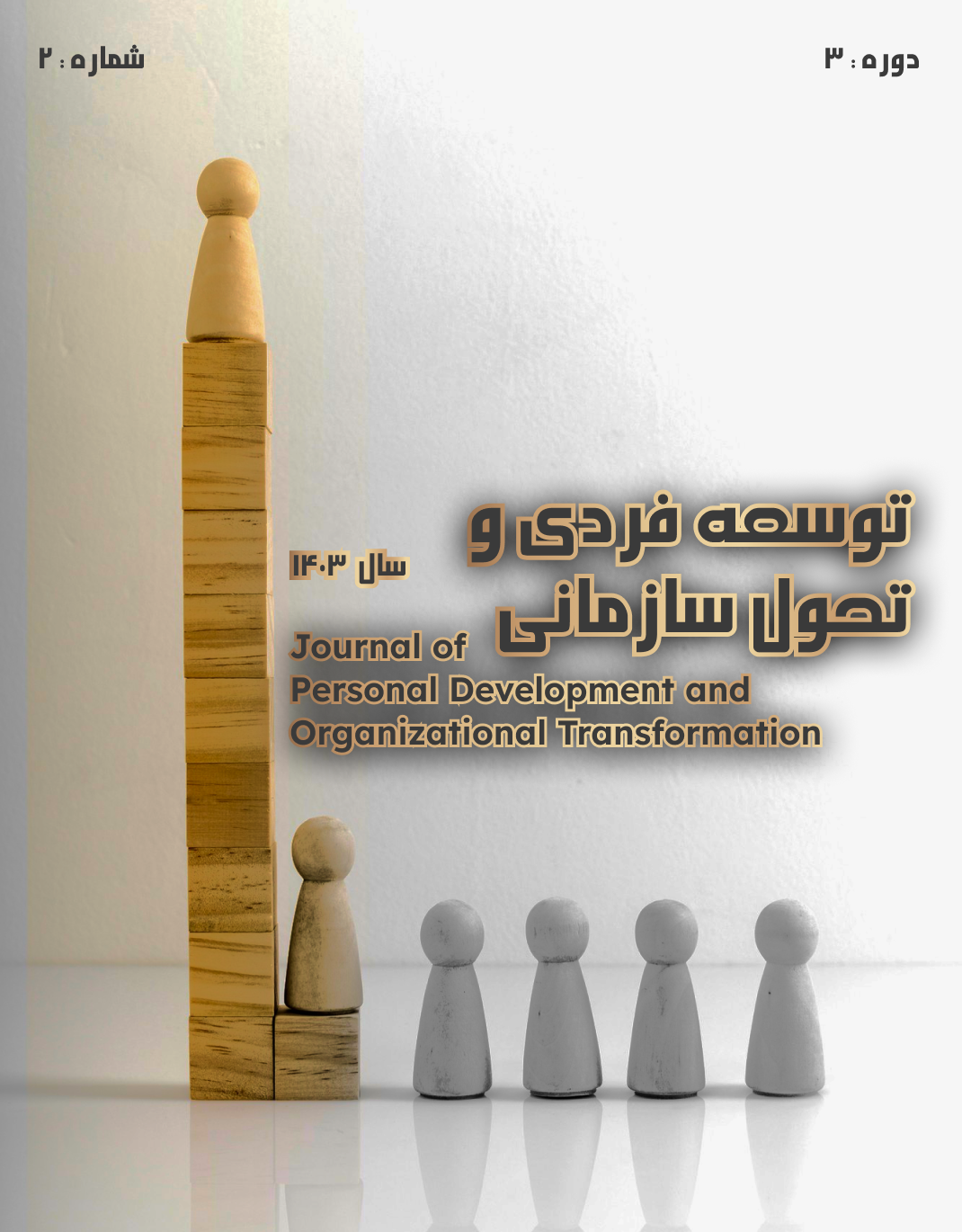بررسی و تحلیل تاثیر شرکتهای دانش بنیان در پیشبرد اهداف سازمانی
کلمات کلیدی:
فراجا, اهداف سازمانی, شرکت دانش بنیانچکیده
هدف اصلی این پژوهش، بررسی و تحلیل تأثیر شرکتهای دانشبنیان بر پیشبرد اهداف سازمانی با تأکید بر بهرهوری سازمانی و عملکرد اقتصادی در سازمانهای نظامی، بهویژه آجا، بوده است. این پژوهش با روش کمی، توصیفی و پیمایشی انجام شده است. جامعه آماری شامل 83 نفر از خبرگان دانشگاهی، کارکنان و فرماندهان ارتش جمهوری اسلامی ایران و مدیران شرکتهای دانشبنیان بود که به روش نمونهگیری تصادفی ساده انتخاب شدند. ابزار گردآوری دادهها پرسشنامهای بر پایه طیف لیکرت بود که روایی آن با نظر خبرگان و پایایی آن با ضریب آلفای کرونباخ تأیید شد. دادهها با استفاده از آزمون t تکنمونهای و آزمون کولموگروف–اسمیرنف تحلیل شدند. نتایج نشان داد که شرکتهای دانشبنیان تأثیر مثبت و معناداری بر چهار مؤلفه کلیدی دارند: ارتقای شاخصهای دانشبنیان سازمانی (با میانگین تفاوت 1.831 برای تولید دانشمحور)، پیشبرد اهداف سازمانی (t=48.77, p<0.001)، بهبود بهرهوری کاری و سازمانی (t=47.29, p<0.001)، و تقویت عملکرد اقتصادی (t=19.70, p<0.001). همچنین، نوآوری، تبدیل دانش به ثروت، استفاده از فناوریهای نوین و تعامل با محیط بیرونی از مهمترین فاکتورهای مورد تأیید پاسخدهندگان بودهاند. شرکتهای دانشبنیان، بهویژه در حوزه فناوریهای نوین مانند هوش مصنوعی، نقش راهبردی در تقویت ساختار تصمیمگیری، بهینهسازی فرآیندهای سازمانی، ارتقای بهرهوری نیروی انسانی و بهبود عملکرد اقتصادی دارند. این یافتهها بر لزوم تدوین سیاستهای حمایتی و توسعه تعاملات راهبردی میان سازمانهای نظامی و شرکتهای دانشبنیان تأکید دارند.
دانلودها
مراجع
Bagherian Kasgari, B., & Fani, Z. (2020). The Importance and Role of Knowledge Management in the Strategic Human Resource Management Performance of Knowledge-Based Organizations. 6th National Conference on Applied Research in Management, Accounting, and Sound Economy in Banking, Stock Market, and Insurance, Tehran. https://civilica.com/doc/1121971/
Bamdad Soofi, J., Salehi Sedghiani, J., Khatami Firoozabadi, S. M., & Fathabadi, H. (2018). Introducing a Knowledge-Based Organization Model for the Army of the Islamic Republic of Iran. Defensive Strategy Quarterly, 16(4). https://ds.sndu.ac.ir/article_411.html
Dashtbani, Y., & Aslani Afrashteh, A. (2023). A Model for Cooperation Between Defense Industries and Knowledge-Based Companies with an Approach to Strengthening Civil-Military Synergy. Defense Economics Quarterly, 8(29). https://eghtesad.sndu.ac.ir/article_2631.html
Dolińska, M. (2015). Knowledge based development of innovative companies within the framework of innovation networks. Innovation, 17(3), 323-340. https://doi.org/10.1080/14479338.2015.1054603
Fathabadi, H., & Bamdad Soofi, J. (2021). Identifying Components of Knowledge Worker Management in Knowledge-Based Organizations of the Army of the Islamic Republic of Iran. Defensive Strategy Quarterly, 19(1). https://civilica.com/doc/1225852/
Feyzbakhsh, O. A. B., Babalhavaeji, F., Nezafati, N., Hariri, N., & Nooshinfard, F. (2022). Presenting an open data management (ecosystem) model with developing innovative information flow approach in Iranian knowledge-based companies. Aslib Journal of Information Management, 74(3), 458-494. https://doi.org/10.1108/AJIM-07-2021-0186
Ghorbani, S., & Khanachah, S. N. (2020). Provide a model for establishing a comprehensive knowledge management system in knowledge-based organizations based on success factors. Annals of Management and Organization Research, 2(1), 1-12. https://doi.org/10.35912/amor.v2i1.569
Lotfi, M., Yousefi, A., & Jafari, S. (2018). The effect of emerging green market on green entrepreneurship and sustainable development in knowledge-based companies. Sustainability, 10(7), 2308. https://doi.org/10.3390/su10072308
Mubarakh, C., Miswanto, M., Siregar, B., Biyanto, F., & Kartika, F. (2025). The Strategic Role of Knowledge Management in Mediating the Relationship Between Servant Leadership and Organizational Value. International Journal of Research and Innovation in Applied Science, X(I), 335-352. https://doi.org/10.51584/ijrias.2025.1001027
Nguyen, M., & Sharma, P. (2024). Interactive Impact of Transformational Leadership and Organizational Innovation on Online Knowledge Sharing: A Knowledge Management Perspective. Journal of Knowledge Management, 28(4), 1164-1182. https://doi.org/10.1108/jkm-09-2022-0758
Nguyen, M., Sharma, P., & Malik, A. (2024). Leadership styles and employee creativity: the interactive impact of online knowledge sharing and organizational innovation. Journal of Knowledge Management, 28(3), 631-650. https://doi.org/10.1108/JKM-01-2023-0014
Nicolaescu, S. S., Florea, A., Kifor, C. V., Fiore, U., Cocan, N., Receu, I., & Zanetti, P. (2020). Human capital evaluation in knowledge-based organizations based on big data analytics. Future Generation Computer Systems, 111, 654-667. https://doi.org/10.1016/j.future.2019.09.048
Rezaei, A., Hojjatinia, M. H., & Ghazi, H. (2018). Creativity and Innovation in Knowledge-Based Defense Organizations (Case Study: Directorate of Research and Self-Sufficiency Jihad of the Army of the Islamic Republic of Iran). Naval Science Education Quarterly, 5(4). https://elmnet.ir/doc/2016531-24617
Sabzi, M., Rangriz, H., & Kheyrandish, M. (2023). A Systemic Model for Human Resource Development in Knowledge-Based Companies with a Qualitative Approach. Innovation Management in Defense Organizations, 6(1), 175-204.
Sepúlveda-Rivillas, C. I., Alegre, J., & Oltra, V. (2022). Impact of knowledge-based organizational support on organizational performance through project management. Journal of Knowledge Management, 26(4), 993-1013. https://doi.org/10.1108/JKM-12-2020-0887
Shemshadi, I. (2024). The impact of the knowledge-oriented leadership and culture on innovation and performance of organizational with emphasis on the role of mediator of Practices and process of knowledge management. Transactions on Data Analysis in Social Science, 6(2), 45-59. https://www.transoscience.ir/article_210139.html
Taheri, M., & Haji, Z. (2023). Examining the Impact of Internal Marketing and Organizational Learning on Employee Performance Improvement with the Mediating Role of Organizational Innovation (Case Study: Small and Medium Enterprises in Tehran). Knowledge-Based Business Management, 3(27), 63-89.
Van Laar, D. M. (2023). Knowledge Management Implementation in US Army Headquarters: A Case Study. https://scholarworks.waldenu.edu/cgi/viewcontent.cgi?article=15846&context=dissertations
Yar Ahmadi, L., Arefi, M., & Vahdati, H. (2023). Examining the Impact of Intra-Organizational Characteristics on Competitive Advantage with the Mediating Role of Entrepreneurial Marketing in Knowledge-Based Organizations. Productivity management, 17(64), 71-92.
Zabihi Jamkhaneh, M., & Bagheri Jamkhaneh, A. (2019). The Role of Information Systems and Knowledge Management in the Knowledge-Based Transformation of Organizations (Case Study: A Military Research Organization). Scientific Journal of Mazandaran Police Knowledge, 10(3). https://civilica.com/doc/1709492/
Zahedi, M. R., & Naghdi Khanachah, S. (2020). Designing and implementing a model of organizational readiness assessment to become a knowledge-based organization: Case study an Iranian research center. Quarterly journal of Industrial Technology Development, 18(40), 65-76. https://jtd.iranjournals.ir/article_44652.html
Zeidi, M., & Shariat, A. (2023). Understanding and Explaining the Phenomenon of Cognitive Fatigue in Managers of Knowledge-Based Companies. Organizational Knowledge Management, 6(20), 209-239.
دانلود
چاپ شده
ارسال
بازنگری
پذیرش
شماره
نوع مقاله
مجوز
حق نشر 2025 Javad Eshaghi

این پروژه تحت مجوز بین المللی Creative Commons Attribution-NonCommercial 4.0 می باشد.







